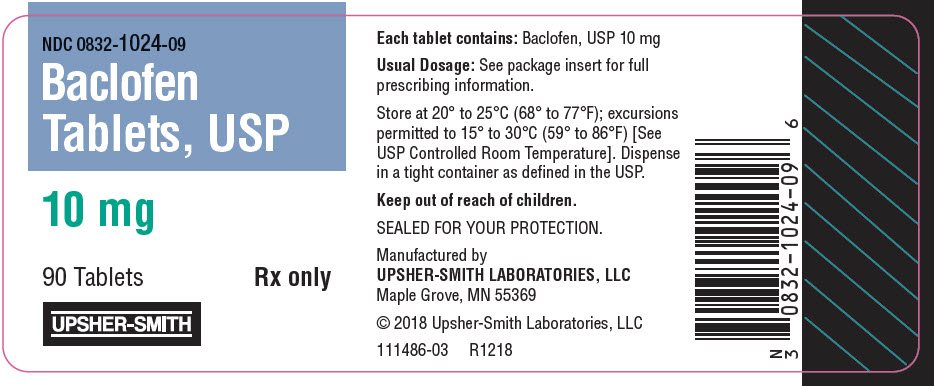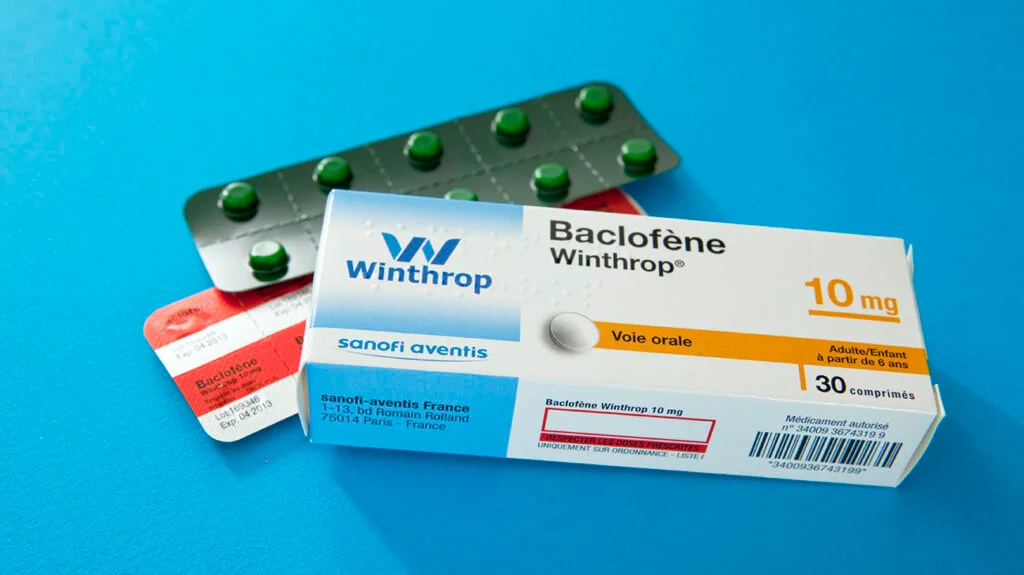Why is Baclofen Prescribed?
Baclofen is used to treat pain and certain types of spasticity (muscle stiffness and tightness) from multiple sclerosis, spinal cord injuries, or other spinal cord diseases.
Baclofen is in a class of medications called skeletal muscle relaxants. Baclofen acts on the spinal cord nerves and decreases the number and severity of muscle spasms caused by multiple sclerosis or spinal cord conditions. It also relieves pain and improves muscle movement.
It’s used to relieve muscle spasms, cramping or tightness caused by conditions such as:
- cerebral palsy
- meningitis
- motor neurone disease
- multiple sclerosis
- conditions affecting your brain, spinal cord and nervous system
Baclofen is available on prescription. It comes as tablets or a liquid that you swallow.

How Should Baclofen be Used?
Baclofen comes as a tablet and a solution (liquid) to take by mouth. It usually is taken 3 times a day at evenly spaced intervals. Follow the directions on your prescription label carefully, and ask your doctor or pharmacist to explain any part you do not understand. Take baclofen exactly as directed. Do not take more or less of it or take it more often than prescribed by your doctor.
Use an oral syringe (measuring device) to accurately measure and take your dose of baclofen solution. Ask your pharmacist for an oral syringe if one is not included with your medication.
Continue to take baclofen even if you feel well. Do not stop taking baclofen without talking to your doctor, especially if you have taken large doses for a long time. Abruptly stopping this medication can cause seizures, fever, confusion, muscle stiffness, or hallucinations. Your doctor probably will want to decrease your dose gradually.
Off-label Uses for Baclofen [1]
- Alcohol Use Disorder (AUD): Baclofen has gained attention for its potential use in treating alcohol dependence. Some studies have suggested that baclofen might reduce cravings and withdrawal symptoms associated with alcohol cessation. However, the use of baclofen for this purpose is controversial, and further research is needed to establish its efficacy and safety.
- Cocaine and Opioid Dependence: Similar to its potential role in treating alcohol dependence, baclofen has been explored for its effects on reducing cravings and withdrawal symptoms in individuals with cocaine and opioid dependence. Again, research in this area is limited, and more studies are necessary.
- Gastroesophageal Reflux Disease (GERD): Baclofen’s muscle relaxant properties may help reduce lower esophageal sphincter pressure, potentially preventing the reflux of stomach contents into the esophagus. Some studies have investigated the use of baclofen as an adjunctive treatment for GERD. One of the most widely postulated mechanisms for the development of reflux symptoms is excess transient lower esophageal sphincter relaxation (TLESR) episodes. These episodes are physiologic processes that allow for venting of gastric gas and act as protection against the accumulation of excess gas in the stomach. TLESRs are vasovagally induced reflexes that are triggered by gastric distention and work via several neurotransmitters and receptors, including the GABAB receptor. Through its GABAB receptor activity, baclofen inhibits TLESRs, and has been shown to significantly inhibit gastroesophageal reflux disease (GERD) episodes in both healthy volunteers and in patients with reflux disease.
- Hiccups: Baclofen has been used to alleviate persistent hiccups in some cases. Its muscle relaxant effects may influence the spasms responsible for hiccups.
- Tourette Syndrome: There is limited evidence suggesting that baclofen may be beneficial in managing symptoms of Tourette syndrome, a neurological disorder characterized by repetitive, involuntary movements and vocalizations (tics).
Other off-label uses: There are case reports or small studies describing the off-label use of baclofen for the treatment of several clinical entities, including muscle spasm/musculoskeletal pain, persistent/chronic hiccups, autism spectrum disorders, chronic post-traumatic stress disorder (PTSD), narcolepsy, persistent speech stuttering, post-hemorrhoidectomy pain, trigeminal neuralgia, and low back pain.

What Special Precautions Should I Follow?
Before taking baclofen,
- tell your doctor and pharmacist if you are allergic to baclofen, any other medications, or any of the ingredients in baclofen tablets and oral solution. Ask your pharmacist for a list of the ingredients.
- tell your doctor and pharmacist what other prescription and nonprescription medications, vitamins, nutritional supplements, and herbal products you are taking or plan to take. Be sure to mention any of the following: antidepressants, medications for anxiety, medications for mental illness, medications for seizures, sedatives, sleeping pills, or tranquilizers. Your doctor may need to change the doses of your medications or monitor you carefully for side effects.
- tell your doctor if you have or have ever had epilepsy, a stroke, a rheumatic disease, cerebral palsy, Parkinson’s disease, a psychiatric condition such as schizophrenia or a confusional state, or kidney disease.
- tell your doctor if you are pregnant, plan to become pregnant, or are breast-feeding. If you become pregnant while taking baclofen, call your doctor immediately.
- you should know that baclofen may make you drowsy. Do not drive a car or operate machinery until you know how this medication affects you.
- ask your doctor about the safe use of alcoholic beverages while you are taking baclofen. Alcohol can make the side effects from baclofen worse.
Balofen and pregnancy
Baclofen is not often recommended in pregnancy. However, if you need baclofen to stay well, your doctor may recommend that you keep taking it. Talk to your doctor about the benefits and possible risks of taking baclofen in pregnancy. If you take it in later pregnancy your baby may need to be monitored for withdrawal symptoms.
If you become pregnant while taking baclofen then contact your doctor. They may recommend reducing your dose or gradually stopping the medicine.
Baclofen and breastfeeding
If your doctor or health visitor says your baby is healthy, you can take baclofen while you’re breastfeeding. It’s important to keep taking baclofen to keep you well. There is not much information about taking baclofen while breastfeeding, but information shows that it passes into breast milk in small amounts. It has not been known to cause any side effects in breastfed babies.
Contact your health visitor, midwife, pharmacist or doctor as soon as possible if your baby:
- is not feeding as well as usual or seems to have a dry mouth
- seems unusually sleepy
- is sweaty or develops a rash
- is being sick or has diarrhoea
- is causing you any other concerns
Baclofen and fertility
There’s no evidence to suggest that taking baclofen will reduce fertility in either men or women. But speak to a pharmacist or your doctor if you’re trying to get pregnant.
What Should I do if I Forget a Dose?
Take the missed dose as soon as you remember it. However, if it is almost time for the next dose, skip the missed dose and continue your regular dosing schedule. Do not take a double dose to make up for a missed one.
What Side Effects can Baclofen Cause?
Baclofen may cause side effects. Tell your doctor if any of these symptoms are severe or do not go away:
These common side effects of baclofen happen in more than 1 in 100 people. There are things you can do to help cope with them:
- dizziness
- weakness
- confusion
- headache
- nausea
- constipation
- difficulty falling asleep or staying asleep
- tiredness
- frequent urination
Speak to a doctor or pharmacist if the advice on how to cope does not help and a side effect is still bothering you or does not go away.
Some side effects can be serious. If you experience either of the following symptoms, call your doctor immediately:
Serious side effects are rare and happen in less than 1 in 10,000 people.
Tell your doctor or call 111 if:
- the whites of your eyes turn yellow, or your skin turns yellow (this may be less obvious on brown or black skin) – this can be a sign of liver problems
- you have difficulty breathing while you’re sleeping (sleep apnoea)
- you are having more muscle spasms than usual
- seeing things or hearing voices that do not exist
- seizures
If you experience a serious side effect, you or your doctor may send a report to the Food and Drug Administration’s (FDA) MedWatch Adverse Event Reporting program online (http://www.fda.gov/Safety/MedWatch) or by phone (1-800-332-1088).

Mechanism of Action of Baclofen
Baclofen (beta-[4-chlorophenyl]-GABA) is an agonist at the beta subunit of gamma-aminobutyric acid on mono and polysynaptic neurons at the spinal cord level and brain.[3] The thinking is that baclofen reduces the release of excitatory neurotransmitters in the pre-synaptic neurons and stimulates inhibitory neuronal signals in the post-synaptic neurons with resultant relief of spasticity. Baclofen is also found to have an affinity for voltage-gated calcium channels. However, its clinical efficacy in this regard is still unclear.
Baclofen has a bioavailability of 70% to 85% and is therefore rapidly absorbed through the gastrointestinal tract following oral administration. Peak plasma concentrations are generally observed 2 to 3 hours after ingestion. The absorption is dose-dependent and increases with higher doses. Due to the short half-life of 2 to 6 hours, baclofen should be administrated frequently to achieve optimal effect. Seventy percent of baclofen is eliminated in an unchanged form by renal excretion and the remaining via feces. Thereby, baclofen is a useful agent in patients with impaired hepatic function or a high potential for cytochrome P450-mediated drug-drug interactions. Research has observed significant inter-individual variability in baclofen’s absorption and elimination processes.
Administration of Baclofen
Baclofen is available for oral, transdermal, and intrathecal administration through pump infusion. Oral administration is initially 5 mg three times a day. The dose is increased every 3 days until achieving an optimal response; however, the dose should not exceed 80 mg per day. The usual dosage is 40 to 80 mg daily.
Intrathecal administration of baclofen initiates via screening. The patient receives a single dose, typically 50 mcg baclofen and is observed for 4 to 8 hours to assess its efficacy. The screening dose that gives a positive response for the first 24 hours will then be doubled and administrated via an implantable pump with an intrathecal catheter. Daily dose adjustments will be made gradually on the order of 10% to 30% for spasticity of spinal cord origin and 5% to 15% for spasticity of cerebral origin until attaining a positive response. The dose may be increased or decreased slightly to obtain an optimum daily dose. Spasticity of cerebral origin is usually adequately managed on 90 to 703 mcg daily. Spasticity related to the spinal cord usually requires 300 to 800 mcg of baclofen daily. However, the lowest dose that produces optimal response should be maintained. The reservoir in the pump is filled by percutaneous injections regularly, and the pump is programmed to deliver a precise dose automatically, via simple continuous or bolus dosing.
The majority of the patients on chronic baclofen therapy require gradual dose increases over time due to a lack of response to the original maintenance dose. Up to 10% of patients become resistant to dose titrations and may need a drug holiday. Drug holidays should only be in an inpatient setting with gradual withdrawal over 2 to 4 weeks. Alternative therapy for spasticity should be administrated simultaneously.
Researchers have not established the safety and efficacy of baclofen in pediatric populations younger than 12 years old.

How to Store or Dispose of Baclofen?
Keep this medication in the container it came in, tightly closed, and out of reach of children. Store the tablets at room temperature and away from excess heat and moisture (not in the bathroom). Store the oral solution in the refrigerator.
It is important to keep all medication out of sight and reach of children as many containers (such as weekly pill minders and those for eye drops, creams, patches, and inhalers) are not child-resistant and young children can open them easily. To protect young children from poisoning, always lock safety caps and immediately place the medication in a safe location – one that is up and away and out of their sight and reach. http://www.upandaway.org
Unneeded medications should be disposed of in special ways to ensure that pets, children, and other people cannot consume them. However, you should not flush this medication down the toilet. Instead, the best way to dispose of your medication is through a medicine take-back program. Talk to your pharmacist or contact your local garbage/recycling department to learn about take-back programs in your community. See the FDA’s Safe Disposal of Medicines website (http://goo.gl/c4Rm4p) for more information if you do not have access to a take-back program.
In Case of Emergency/Overdose
In case of overdose, call the poison control helpline at 1-800-222-1222. Information is also available online at https://www.poisonhelp.org/help. If the victim has collapsed, had a seizure, has trouble breathing, or can’t be awakened, immediately call emergency services at 911.
Symptoms of overdose may include:
- vomiting
- weak muscle tone
- drowsiness
- vision problems
- coma
- difficulty breathing
- seizures
Taking Baclofen With Other Medicines and Herbal Supplements
Cautions with other medicines
Some medicines and baclofen can affect each other and increase your risk of side effects.
Tell your pharmacist or doctor if you’re taking any of these medicines before taking baclofen:
- other medicines to relax muscles such as tizanidine
- lithium, a medicine for mental health problems
- antidepressants such as amitriptyline
- medicines that lower high blood pressure
- non-steroidal anti-inflammatory drugs (NSAIDs) such as ibuprofen
- levodopa, a medicine for Parkinson’s disease
Mixing baclofen with herbal remedies and supplements
There’s not enough information to say that herbal remedies and supplements are safe to take with baclofen. They’re not tested in the same way as pharmacy and prescription medicines. They’re generally not tested for the effect they have on other medicines.
What Other Information Should I Know?
Keep all appointments with your doctor.
Do not let anyone else take your medication. Ask your pharmacist any questions you have about refilling your prescription.
It is important for you to keep a written list of all of the prescription and nonprescription (over-the-counter) medicines you are taking, as well as any products such as vitamins, minerals, or other dietary supplements. You should bring this list with you each time you visit a doctor or if you are admitted to a hospital. It is also important information to carry with you in case of emergencies.
Brand names
- Kemstro®¶
- Lioresal®¶
- Ozobax®
¶This branded product is no longer on the market. Generic alternatives may be available.
Last Revised – 12/15/2019
[1] https://www.ncbi.nlm.nih.gov/pmc/articles/PMC8182184/
Is It Legal to Buy Baclofen Online ?
YES. If you have US Licensed Doctor’s Prescription